

Memory in older adults. How memory and thinking ability change with age. Scientists used to think that brain connections developed at a rapid pace in the first few years of life, until you reached your mental peak in your early 20s.
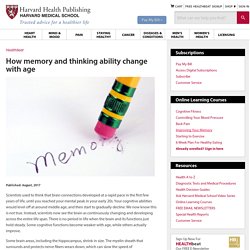
Your cognitive abilities would level off at around middle age, and then start to gradually decline. We now know this is not true. Instead, scientists now see the brain as continuously changing and developing across the entire life span. There is no period in life when the brain and its functions just hold steady. Some cognitive functions become weaker with age, while others actually improve. Some brain areas, including the hippocampus, shrink in size. On the other hand, the branching of dendrites increases, and connections between distant brain areas strengthen. Age is also the biggest risk factor for many brain diseases, most of which affect brain structure and function. As a result of these changes, you will likely start to notice slight slips in your memory in middle age and beyond. Cognitive decline may begin as early as age 45 - Penn State Hershey Medical Center. Attention span in older adults. Attention Deficit Can Come with Old Age. Source: Are you old enough that this sounds familiar?
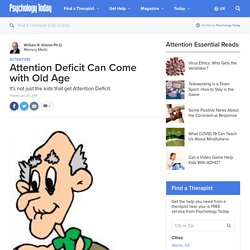
Actually, memory problems like these affect most people at some time, but getting older can make such forgetting worse. These memory problems happen because you lose attention and get distracted. As you get older, it is easier to get distracted. It is as if we get "attention deficit disorder (ADD)" as we age. article continues after advertisement A brain-scan study at the University of Toronto found that older people, compared to young adults, have decreased brain activity in brain areas that enable concentration This means that older brains can't focus well, because the parts of the brain that enable concentration don't get active enough.
To compound the problem, older people show increased activity in parts of the brain that don't normally get activated during memory tasks in younger people. Another study at the University of Illinois examined age-related increase in distractibility. Enough already! Focus, focus, focus. Why people become more prone to distraction with age: A specific brain network, the locus coeruleus, that controls our ability to focus while under stress appears to weaken as we age, interfering with our ability to focus.
Older adults appear more easily distracted by irrelevant information than younger people when they experience stress or powerful emotions -- and a specific network in the brain recently identified as the epicenter for Alzheimer's and dementia may be to blame.
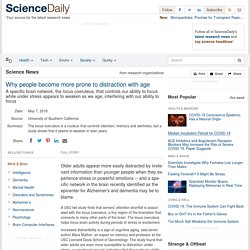
A USC-led study finds that seniors' attention shortfall is associated with the locus coeruleus, a tiny region of the brainstem that connects to many other parts of the brain. The locus coeruleus helps focus brain activity during periods of stress or excitement. Increased distractibility is a sign of cognitive aging, said senior author Mara Mather, an expert on memory and professor at the USC Leonard Davis School of Gerontology. The study found that older adults are even more susceptible to distraction under stress, or emotional arousal, indicating that the nucleus's ability to intensify focus weakens over time.
The study was published on May 7 in Nature Human Behavior. The locus of tau pathology for Alzheimer's. Problem Solving Skills of Older Adults. Problem solving. Are Older People Better Problem Solvers? Are Older People Better Problem Solvers?
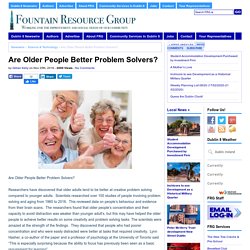
Researchers have discovered that older adults tend to be better at creative problem solving compared to younger adults. Scientists researched over 100 studies of people involving problem solving and aging from 1960 to 2016. This reviewed data on people’s behaviour and evidence from their brain scans. The researchers found that older people’s concentration and their capacity to avoid distraction was weaker than younger adult’s, but this may have helped the older people to achieve better results on some creativity and problem solving tasks. The scientists were amazed at the strength of the findings. The researchers said that the ability to focus does help with certain tasks such as reading.
However, the ability to focus may actually decrease people’s performance on tasks that require overall attention, Hasher, and her colleagues said. Language Acquisition among older adults. The age factor in second language acquisition. Is there an optimal age for second language acquisition?
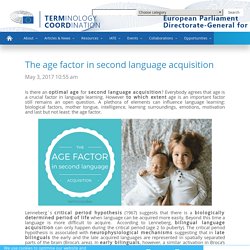
Everybody agrees that age is a crucial factor in language learning. However to which extent age is an important factor still remains an open question. A plethora of elements can influence language learning: biological factors, mother tongue, intelligence, learning surroundings, emotions, motivation and last but not least: the age factor. Lenneberg´s critical period hypothesis (1967) suggests that there is a biologically determined period of life when language can be acquired more easily. Beyond this time a language is more difficult to acquire. The advantages of early second language acquisition In early childhood, becoming bilingual is often an unconscious event, as natural as learning to walk or ride a bicycle. The advantages of late second language acquisition First of all it is important to clarify that by late second language learning we mean learning a language after puberty. Conclusion Sources: 82,732 total views, 9 views today. 100-Year-Old Man Knows It's Never Too Late To Learn A Language.